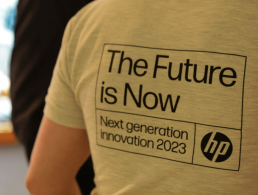A report by HP suggests most staff around the world have an unhealthy relationship with their work and that salary is not a key factor in this issue.
With the amount of time people give to their jobs, it’s nice to assume that most people have a positive relationship with their work, but a recent study suggests this is not the case.
In September, HP created its first Work Relationship Index (WRI), which analysed the relationship between employees and their work worldwide.
This index surveyed more than 15,600 respondents across various industries in 12 countries and found that most had an unhealthy relationship with work. The majority of people surveyed were classified as ‘knowledge workers’ – which HP defined as primarily desk-based (including hybrid and remote workers).
The survey suggested that 73pc of these workers have an unhealthy relationship with work, which can have significant impacts on an employee’s health, personal life and productivity.
But what can lead to an employee having an unhealthy relationship with work? HP Ireland MD Val Gabriel told SiliconRepublic.com that the company looked at 50 aspects of society’s relationship with work and found six key drivers that employers should take note of.
“HP looked at how people feel about their skills and abilities, the role of work in their lives, the space they work in, the tools and technology they use and their expectations of leadership, which resulted in HP identifying these six key drivers that can lead to a healthy relationship with work,” Gabriel said.
Some of the key drivers HP identified are fulfilment – having a genuine connection to work – leadership and people-centricity – which includes being treated with respect and a healthy work-life balance.
The other drivers were skills – and receiving the right training to feel proficient – tools and workspace, which includes having a choice in where they work in the form of hybrid of flexible working options.
“Beyond this, salary, relationships with peers at work and alignment with an employer’s mission were also included, among others,” Gabriel said.
Gabriel said there isn’t one driver in particular among these six that is “more important or urgent over another” and encouraged business leaders to adopt a similar view.
“All of these core drivers foster action and can help employees build a better relationship with work,” Gabriel said.
The index did not include Irish workers, but in terms of workers reporting a healthy workplace relationship, Gabriel noted that the more mature markets all scored at or below the global average of 27pc, unlike emerging economies where scores where higher.
The impact of our relationship with work
The HP index suggests there are serious consequences to an employee having an unhealthy relationship with work. Many employees that have unhealthy relationships with work claimed it leads to issues with their mental health, their relationships with friends and family, and their physical wellbeing, according to the survey.
For their workplace, reduced productivity and the desire to leave the company become significant issues. Even when employees feel neutral about their relationship with work, the survey suggests that more than 71pc consider leaving their company, while 91pc consider leaving when they’re not happy with their workplace.
“Some workers are prone to reduced productivity if they are in an unhappy period with work, even individuals who are currently in healthy relationships with work, risk lower productivity when things with work are not at their optimum,” Gabriel said.
“It is important to note that while people with healthy relationships with work can have decreased productivity, workers with unhealthy work relationships experience these instances at a higher rate.”
Meanwhile, there are clear benefits when workers have a healthy relationship with work. The index suggests that some knowledge workers would be willing to take a pay cut if certain other benefits were included, such as a better feelings of fulfilment, more empathetic leadership and options to work where and when they want.
“Those with a healthy relationship with work are more likely to agree that they are compensated fairly than those with an unhealthy relationship with work,” Gabriel said. “However, and as with many other related findings, salary was not identified as a top driver of a healthy relationship with work.”
HP said business leaders need to consider these key drivers to attract workers and that expectations among employees are changing. About three-quarters of the business leaders surveyed acknowledged that emotionally intelligent leadership is required for a leader to be successful.
Meanwhile, 83pc of the knowledge workers surveyed suggested they would be willing to earn less money if they found an employer that has leadership qualities such as emotional intelligence and increased trust and agency in their staff.
“The key takeaway from this research finding is the importance that employees place on finding and experiencing greater emotional intelligence, trust and agency at work,” Gabriel said. “For all employers, providing this along with autonomy, flexibility, training – and fostering an environment with greater empathy – can significantly improve the employee experience.
“This is a valuable and powerful signal of what companies need to get right if they are to keep teams inspired and engaged.”
In September, Thea Watson of BrightHR shared various tips on how employers can maintain happiness in the workplace, which included offering perks for employees and internal initiatives to build a healthy workplace culture.
10 things you need to know direct to your inbox every weekday. Sign up for the Daily Brief, Silicon Republic’s digest of essential sci-tech news.




